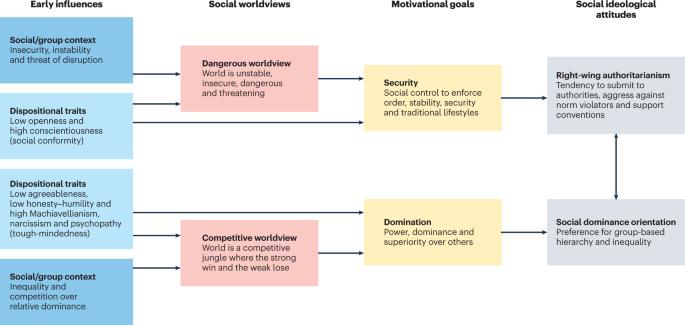The psychological causes and societal consequences of authoritarianism
IF 16.8
Q1 PSYCHOLOGY, MULTIDISCIPLINARY
引用次数: 3
Abstract
Over the past two decades, citizens’ political rights and civil liberties have declined globally. Psychological science can play an instrumental role in both explaining and combating the authoritarian impulses that underlie these attacks on personal autonomy. In this Review, we describe the psychological processes and situational factors that foster authoritarianism, as well as the societal consequences of its apparent resurgence within the general population. First, we summarize the dual process motivational model of ideology and prejudice, which suggests that viewing the world as a dangerous, but not necessarily competitive, place plants the psychological seeds of authoritarianism. Next, we discuss the evolutionary, genetic, personality and developmental antecedents to authoritarianism and explain how contextual threats to safety and security activate authoritarian predispositions. After examining the harmful consequences of authoritarianism for intergroup relations and broader societal attitudes, we discuss the need to expand the ideological boundaries of authoritarianism and encourage future research to investigate both right-wing and left-wing variants of authoritarianism. Authoritarianism weakens democratic institutions and fosters societal divisions. In this Review, Osborne et al. describe the psychological processes and situational factors that give rise to authoritarianism, as well as the societal consequences of its apparent resurgence within the general population.

专制主义的心理原因和社会后果
过去二十年来,全球公民的政治权利和公民自由都在下降。心理科学可以在解释和打击这些侵犯个人自主权的专制冲动方面发挥重要作用。在这篇综述中,我们将描述助长专制主义的心理过程和情境因素,以及专制主义在普通民众中明显复苏所带来的社会后果。首先,我们总结了意识形态和偏见的双重过程动机模型,该模型认为,将世界视为一个危险但不一定具有竞争性的地方埋下了专制主义的心理种子。接下来,我们讨论了专制主义的进化、遗传、人格和发展前因,并解释了对安全和保障的环境威胁是如何激活专制倾向的。在研究了威权主义对群体间关系和更广泛的社会态度造成的有害后果之后,我们讨论了扩大威权主义意识形态界限的必要性,并鼓励未来的研究对威权主义的右翼和左翼变体进行调查。威权主义削弱了民主体制,助长了社会分裂。在这篇评论中,奥斯本等人描述了导致专制主义产生的心理过程和情境因素,以及专制主义在普通人群中明显复苏所带来的社会后果。
本文章由计算机程序翻译,如有差异,请以英文原文为准。
求助全文
约1分钟内获得全文
求助全文

 求助内容:
求助内容: 应助结果提醒方式:
应助结果提醒方式:


